Mercedes EQV vs Toyota Proace Transporter – Which model is better for everyday use?
Two cars, one duel: Mercedes EQV meets Toyota Proace Transporter.
Which one wins in performance, efficiency and value for money? Find out now!
Costs and Efficiency:
Price and efficiency are key factors when choosing a car – and this is often where the real differences emerge.
Toyota Proace Transporter has a decisively advantage in terms of price – it starts at 31600 £, while the Mercedes EQV costs 50700 £. That’s a price difference of around 19112 £.
In terms of energy consumption, the advantage goes to the Toyota Proace Transporter: with 23.80 kWh per 100 km, it’s slightly more efficient than the Mercedes EQV with 27.10 kWh. That’s a difference of about 3.30 kWh.
As for range, the Mercedes EQV performs barely noticeable better – achieving up to 364 km, about 15 km more than the Toyota Proace Transporter.
Engine and Performance:
Power, torque and acceleration say a lot about how a car feels on the road. This is where you see which model delivers more driving dynamics.
When it comes to engine power, the Mercedes EQV has a clearly perceptible edge – offering 204 HP compared to 150 HP. That’s roughly 54 HP more horsepower.
In acceleration from 0 to 100 km/h, the Mercedes EQV is somewhat quicker – completing the sprint in 10.30 s, while the Toyota Proace Transporter takes 12.10 s. That’s about 1.80 s faster.
In terms of top speed, the Toyota Proace Transporter performs slightly better – reaching 170 km/h, while the Mercedes EQV tops out at 140 km/h. The difference is around 30 km/h.
There’s also a difference in torque: Toyota Proace Transporter pulls hardly perceptible stronger with 370 Nm compared to 365 Nm. That’s about 5 Nm difference.
Space and Everyday Use:
Beyond pure performance, interior space and usability matter most in daily life. This is where you see which car is more practical and versatile.
Both vehicles offer seating for 6 people.
In curb weight, Toyota Proace Transporter is decisively lighter – 1656 kg compared to 2666 kg. The difference is around 1010 kg.
In maximum load capacity, the Toyota Proace Transporter performs evident better – up to 6600 L, which is about 1590 L more than the Mercedes EQV.
When it comes to payload, Toyota Proace Transporter evident takes the win – 1323 kg compared to 834 kg. That’s a difference of about 489 kg.
Who comes out on top?
Overall, the Toyota Proace Transporter shows itself to be is largely superior and secures the title of DriveDuel Champion.
It convinces with the more balanced overall package and proves to be the more versatile choice for everyday use.
Toyota Proace Transporter
Mercedes EQV
The Mercedes-Benz EQV stands out as a versatile electric vehicle combining luxury with practicality, making it an ideal choice for environmentally conscious families. With its spacious interior and sleek design, it offers a premium driving experience that aligns with the brand's reputation for quality and innovation. As a sustainable option in the realm of people carriers, it exhibits the perfect balance between cutting-edge technology and everyday usability.
details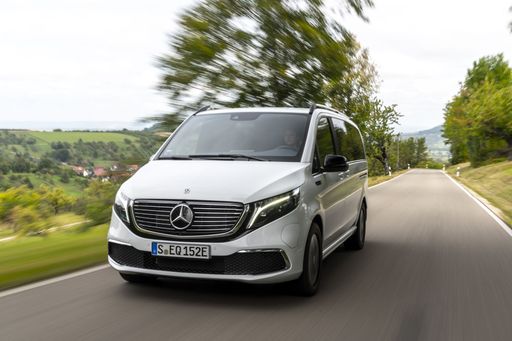 @ group-media.mercedes-benz.com
@ group-media.mercedes-benz.com
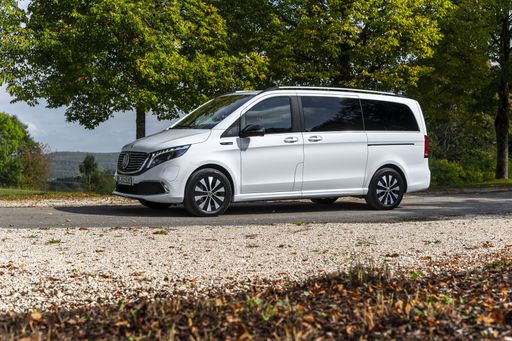 @ group-media.mercedes-benz.com
@ group-media.mercedes-benz.com
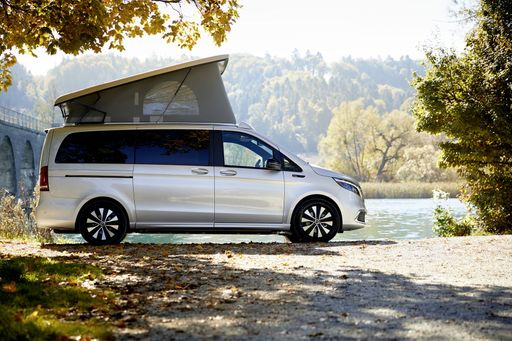 @ group-media.mercedes-benz.com
@ group-media.mercedes-benz.com
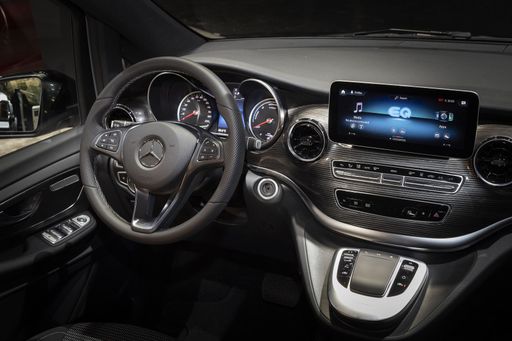 @ group-media.mercedes-benz.com
@ group-media.mercedes-benz.com
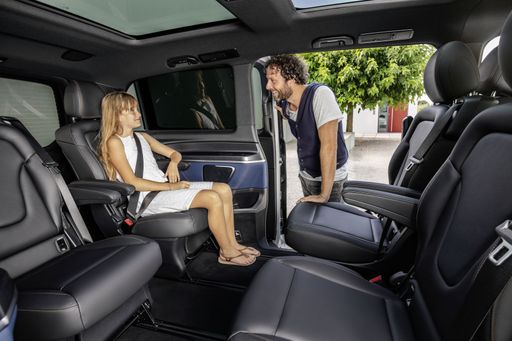 @ group-media.mercedes-benz.com
@ group-media.mercedes-benz.com
Toyota Proace Transporter
The Toyota Proace Transporter is a versatile vehicle designed to meet a variety of professional needs. With a focus on practicality, it offers a spacious interior and a flexible layout that can be adapted for both goods and passenger transport. Its efficient design and reliable performance make it a popular choice for businesses looking for a dependable workhorse.
details

|
|
|
|
|
Costs and Consumption |
|
|---|---|
|
Price
50700 - 54400 £
|
Price
31600 - 51000 £
|
|
Consumption L/100km
-
|
Consumption L/100km
6.4 - 6.7 L
|
|
Consumption kWh/100km
27.1 - 27.5 kWh
|
Consumption kWh/100km
23.8 - 23.9 kWh
|
|
Electric Range
244 - 364 km
|
Electric Range
221 - 349 km
|
|
Battery Capacity
60 - 90 kWh
|
Battery Capacity
-
|
|
co2
0 g/km
|
co2
0 - 177 g/km
|
|
Fuel tank capacity
-
|
Fuel tank capacity
69 L
|
Dimensions and Body |
|
|---|---|
|
Body Type
Bus
|
Body Type
Cargo Van
|
|
Seats
6
|
Seats
3 - 6
|
|
Doors
5
|
Doors
4 - 5
|
|
Curb weight
2666 - 2863 kg
|
Curb weight
1656 - 2100 kg
|
|
Trunk capacity
1030 - 1410 L
|
Trunk capacity
-
|
|
Length
5140 - 5370 mm
|
Length
4980 - 5330 mm
|
|
Width
1928 mm
|
Width
1920 mm
|
|
Height
1920 - 1923 mm
|
Height
1895 - 1935 mm
|
|
Max trunk capacity
4630 - 5010 L
|
Max trunk capacity
3200 - 6600 L
|
|
Payload
637 - 834 kg
|
Payload
955 - 1323 kg
|
Engine and Performance |
|
|---|---|
|
Engine Type
Electric
|
Engine Type
Electric, Diesel
|
|
Transmission
Automatic
|
Transmission
Automatic, Manuel
|
|
Transmission Detail
Reduction Gearbox
|
Transmission Detail
Reduction Gearbox, Manual Gearbox, Automatic Gearbox
|
|
Drive Type
Front-Wheel Drive
|
Drive Type
Front-Wheel Drive
|
|
Power HP
204 HP
|
Power HP
120 - 150 HP
|
|
Acceleration 0-100km/h
10.3 - 12.1 s
|
Acceleration 0-100km/h
12.1 - 13.3 s
|
|
Max Speed
140 km/h
|
Max Speed
130 - 170 km/h
|
|
Torque
365 Nm
|
Torque
260 - 370 Nm
|
|
Number of Cylinders
-
|
Number of Cylinders
4
|
|
Power kW
150 kW
|
Power kW
88 - 110 kW
|
|
Engine capacity
-
|
Engine capacity
1499 - 2184 cm3
|
General |
|
|---|---|
|
Model Year
2024
|
Model Year
2024 - 2025
|
|
CO2 Efficiency Class
A
|
CO2 Efficiency Class
A
|
|
Brand
Mercedes-Benz
|
Brand
Toyota
|
What drive types are available for the Mercedes EQV?
The Mercedes EQV is available as Front-Wheel Drive.
The prices and data displayed are estimates based on German list prices and may vary by country. This information is not legally binding.
